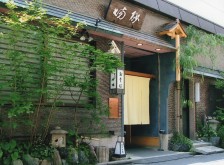Muromachi Sunaba
Muromachi Sunaba
Address:4-1-13 Nihonbashi-muromachi, Chuo-ku, Tokyo Phone: 03-3241-4038 Originally opened at the end of the Edo Period in Gyoranzaka, Takanawa (now Minato Ward), the official establishment date is 1869 when the Nihonbashi shop was constructed. As one of Tokyo’s old soba restaurants, the fragrant soup made by adding richly flavored soy sauce to dashi broth is unique, and […]
Hotel Ryumeikan Ochanomizu Honten
Address: 3-4 Kanda-surugadai, Chiyoda-ku, Tokyo Phone: 03-3251-1135 URL:http://www.ryumeikan-honten.jp/ The Ryumeikan dates back to the end of the Edo period as an offshoot of a hotel in Nihonbashi called Naguraya Ryokan. It was the family tradition for the eldest daughter of the family and her husband to inherit the hotel, so the eldest son, Uhei Hamada, […]
住所:東京都千代田区神田須田町1-11-1 電話:03-3251-1229(代) URL:http://www.isegen.com/ 当店は天保元年(1830)創業の、東京でただ1軒のアンコウ料理の専門店です。 アンコウは、顔つきは悪い(こわい顔)ですが味はすばらしく、骨以外はすべて食べることができる貴重な深海魚です。とくに、肝(あんきも)は珍味として有名で、東洋のフォアグラと呼ばれています。 名物のアンコウ鍋は、手間ひまかけて下ごしらえしたアンコウと相性のよい野菜を、江戸風の味付けをしただしで召し上がっていただく鍋物です。このだしは、代々、店主しか作ることをゆるされていない秘伝のものです。 鍋のほかにも、あん肝の刺身、アンコウの身のから揚げや照り焼きなどの一品料理もございます。 1930年に建てられた本館は、東京都の歴史的建造物に指定されており、古風で趣きのある店内では、まさしく「日本」を味わっていただけると存じます。 なお、アンコウの料理は10月から6月いっぱいで、他の期間は、うなぎ料理や、どじょう料理、日本料理をお出ししています。 <道順> JR神田又は秋葉原・地下鉄丸の内線淡路町駅下車 大きな地図で見る
住所:東京都千代田区神田須田町1-11-1 電話:03-3251-1229(代) URL:http://www.isegen.com/ 当店は天保元年(1830)創業の、東京でただ1軒のアンコウ料理の専門店です。 アンコウは、顔つきは悪い(こわい顔)ですが味はすばらしく、骨以外はすべて食べることができる貴重な深海魚です。とくに、肝(あんきも)は珍味として有名で、東洋のフォアグラと呼ばれています。 名物のアンコウ鍋は、手間ひまかけて下ごしらえしたアンコウと相性のよい野菜を、江戸風の味付けをしただしで召し上がっていただく鍋物です。このだしは、代々、店主しか作ることをゆるされていない秘伝のものです。 鍋のほかにも、あん肝の刺身、アンコウの身のから揚げや照り焼きなどの一品料理もございます。 1930年に建てられた本館は、東京都の歴史的建造物に指定されており、古風で趣きのある店内では、まさしく「日本」を味わっていただけると存じます。 なお、アンコウの料理は10月から6月いっぱいで、他の期間は、うなぎ料理や、どじょう料理、日本料理をお出ししています。 <道順> JR神田又は秋葉原・地下鉄丸の内線淡路町駅下車 大きな地図で見る
住所:東京都千代田区神田須田町1-11-1 電話:03-3251-1229(代) URL:http://www.isegen.com/ 当店は天保元年(1830)創業の、東京でただ1軒のアンコウ料理の専門店です。 アンコウは、顔つきは悪い(こわい顔)ですが味はすばらしく、骨以外はすべて食べることができる貴重な深海魚です。とくに、肝(あんきも)は珍味として有名で、東洋のフォアグラと呼ばれています。 名物のアンコウ鍋は、手間ひまかけて下ごしらえしたアンコウと相性のよい野菜を、江戸風の味付けをしただしで召し上がっていただく鍋物です。このだしは、代々、店主しか作ることをゆるされていない秘伝のものです。 鍋のほかにも、あん肝の刺身、アンコウの身のから揚げや照り焼きなどの一品料理もございます。 1930年に建てられた本館は、東京都の歴史的建造物に指定されており、古風で趣きのある店内では、まさしく「日本」を味わっていただけると存じます。 なお、アンコウの料理は10月から6月いっぱいで、他の期間は、うなぎ料理や、どじょう料理、日本料理をお出ししています。 <道順> JR神田又は秋葉原・地下鉄丸の内線淡路町駅下車 大きな地図で見る
Ibasen
Address :4-1 Nihonbashi Kobunacho, Chuo-ku, Tokyo Phone :03 3664 9261 URL:http://www.ibasen.com/ With a 400 year history, we originally started out in the service of the Shogunate in Edo, dealing in “washi” (Japanese paper) and items made from bamboo. Toward the end of the Edo Period we began handling fans with “ukiyo-e” or wood block prints […]
Isegen
Address :1-11-1 Kanda sudacho, Chiyoda-ku, Tokyo Phone :03 3251 1229 URL:http://www.isegen.com/ Our shop was established in 1830, and is the only restaurant in Tokyo specializing in dishes prepared from “anko” or angler fish. The angler fish is a prized fish that comes from the ocean depths. Its appearance is not the most beautiful sight in […]
Address :1-39-13 Asakusa, Taito-ku, Tokyo Phone :03 3841 4015 URL:http://nakasei.biz/ Founded in1870, Nakasei has carried on the tradition of Edo-style tempura for six generations. Whereas tempura usually consists of deep-fried seafood and vegetables, Edo-style tempura serves nothing but fish and shellfish caught in Tokyo Bay and deep-fried in aromatic sesame oil. Nakasei’s exquisite tempura has […]
Address :1-39-13 Asakusa, Taito-ku, Tokyo Phone :03 3841 4015 URL:http://nakasei.biz/ Amanoya was established in 1846 toward the end of the Edo Period. In ancient China it was customary to exchange cups of rice wine or sake at political gatherings. But there was one very talented, high-ranking official who was unable to drink any form of […]
Chikuyotei
Address :8-14-7 Ginza, Chuo-ku, Tokyo Phone :03 3542 0787 URL:http://www.unagi-chikuyoutei.co.jp/ Our establishment was founded toward the end of the Edo Period. Originally we operated a sword depository, where samurai visiting the Shogunate would check their swords, but this enterprise collapsed when swords were outlawed in 1876, and we went on to open a roadhouse type […]
Benmatsu
Address :1-10-7 Nihonbashi muromachi, Chuo-ku, Tokyo Phone :03 3279 2361 URL:http://www.benmatsu.com/ Toward the end of the Edo Period there was a huge fish market in Nihonbashi, and inside the fish market was a tiny café called “Higuchiya”. The café enjoyed a good reputation and was always crowded with workers from the fish market. These people […]
Chikusen
Address :2-3 Nihonbashi Kobuna-cyo, Chuo-ku, Tokyo Phone :03 5202 0991 URL:http://www.chikusen.co.jp/ Chikusen opened for business in 1842 as a dealer in two very different types of dyed kimonos: Edo Komon and Yukata. Edo Komon is a more formal kimono, appropriate for wearing to a party or perhaps a tea ceremony. The material itself is silk, to […]
Rengyokuan
Address :2-8-7 Ueno, Taito-ku, Tokyo Phone :03 3835 1594 Situated near Ueno Park, Rengyokuan soba or buckwheat noodle shop has been in operation for over 140 years since the end of the Edo Period. Numerous old manuscripts from the Meiji Period on record how intellectuals and men of culture would stop at Rengyokuan when they […]
Kototoi Dango
Address :5-5-22 Mukoujima, Sumida-ku, Tokyo Phone :03 3622 0081 URL:http://www.kototoidango.co.jp/ Kototoi Dango got its start at the end of the Edo Period. Our founder was actually a gardener in the Mukojima district near the Sumida River, and when customers came to call he would serve them dango that he made himself. Soon everyone was talking […]
Isetatsu
Address :2-18-9 Yanaka,Taito-ku,Tokyo Phone :03 3823 1453 URL:http://www.isetatsu.com/ Isetatsu stocks more than 1000 kinds of decorative paper and traditional paper craft patterns, and since its establishment has continued to produce a wide range of Japanese stationary items, toys and good luck charms all crafted from paper printed with traditional patterns and colors of old Edo. […]
Kimuraya Sohonten
Address :4-5-7 Ginza, Chuo-ku, Tokyo Phone :03 3561 0091 URL:http://www.kimuraya-sohonten.co.jp/ Our founder Yasube Kimura started Japan’s first bakery in 1869, just after Japan was opened to the West. At that time, bread in a sense symbolized Western culture, and Yasube continued experimenting to develop breads that were acceptable to the Japanese palate. In 1874 he […]
